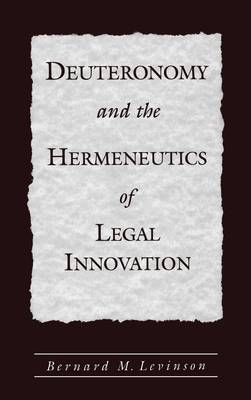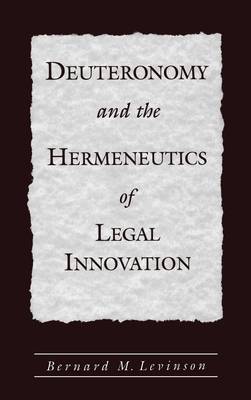
- Retrait gratuit dans votre magasin Club
- 7.000.000 titres dans notre catalogue
- Payer en toute sécurité
- Toujours un magasin près de chez vous
- Retrait gratuit dans votre magasin Club
- 7.000.0000 titres dans notre catalogue
- Payer en toute sécurité
- Toujours un magasin près de chez vous
339,45 €
+ 678 points
Format
Description
Positioned at the boundary of traditional biblical studies, legal history, and literary theory, Deuteronomy and the Hermeneutics of Legal Innovation shows how the legislation of Deuteronomy reflects the struggle of its authors to renew late seventh- century Judean society. Seeking to defend their revolutionary vision during the neo-Assyrian crisis, the reformers turned to earlier laws, even when they disagreed with them, and revised them in such a way as to lend authority to their new understanding of God's will. Passages that other scholars have long viewed as redundant, contradictory, or displaced actually reflect the attempt by Deuteronomy's authors to sanction their new religious aims before the legacy of the past.
Drawing on ancient Near Eastern law and informed by the rich insights of classical and medieval Jewish commentary, Levinson provides an extended study of three key passages in the legal corpus: the unprecedented requirement for the centralization of worship, the law transforming the old Passover into a pilgrimage festival, and the unit replacing traditional village justice with a professionalized judiciary. He demonstrates the profound impact of centralization upon the structure and arrangement of the legal corpus, while providing a theoretical analysis of religious change and cultural renewal in ancient Israel. The book's conclusion shows how the techniques of authorship developed in Deuteronomy provided a model for later Israelite and post- biblical literature.
Integrating the most recent European research on the redaction of Deuteronomy with current American and Israeli scholarship, Levinson argues that biblical interpretation must attend to both the diachronic and the synchronic dimensions of the text. His study, which provides a new perspective on intertextuality, the history of authorship, and techniques of legal innovation in the ancient world, will engage pentateuchal critics and historians of Israelite religion, while reaching out toward current issues in literary theory and Critical Legal Studies.
Drawing on ancient Near Eastern law and informed by the rich insights of classical and medieval Jewish commentary, Levinson provides an extended study of three key passages in the legal corpus: the unprecedented requirement for the centralization of worship, the law transforming the old Passover into a pilgrimage festival, and the unit replacing traditional village justice with a professionalized judiciary. He demonstrates the profound impact of centralization upon the structure and arrangement of the legal corpus, while providing a theoretical analysis of religious change and cultural renewal in ancient Israel. The book's conclusion shows how the techniques of authorship developed in Deuteronomy provided a model for later Israelite and post- biblical literature.
Integrating the most recent European research on the redaction of Deuteronomy with current American and Israeli scholarship, Levinson argues that biblical interpretation must attend to both the diachronic and the synchronic dimensions of the text. His study, which provides a new perspective on intertextuality, the history of authorship, and techniques of legal innovation in the ancient world, will engage pentateuchal critics and historians of Israelite religion, while reaching out toward current issues in literary theory and Critical Legal Studies.
Spécifications
Parties prenantes
- Auteur(s) :
- Editeur:
Contenu
- Nombre de pages :
- 224
- Langue:
- Anglais
Caractéristiques
- EAN:
- 9780195112801
- Date de parution :
- 23-10-97
- Format:
- Livre relié
- Format numérique:
- Genaaid
- Dimensions :
- 164 mm x 243 mm
- Poids :
- 553 g

Les avis
Nous publions uniquement les avis qui respectent les conditions requises. Consultez nos conditions pour les avis.






